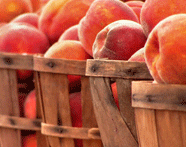10 reasons to go organic!

There are a multitude of reasons for you and your family to start eating organic foods. Organic farming and food is better for health, can prevent the onset of future disease and illness and reduces exposure to toxic elements in our environment. But… that’s not all. Read on to find out why you and your family should go organic!
1. Reduce your intake of harmful herbicides and pesticides
According to the Environmental Protection Agency (EPA), 60% of all herbicides (weed killers), 90% of all fungicides (mold killers), and 30% of all insecticides (insect killers) are potentially cancer causing. Unfortunately, the usage of herbicides and pesticides is on the rapid rise in our food sources. According to testing carried out by the U.S. Department of Agriculture, conventionally grown fruits and vegetables are:
* Three to more than four times more likely on average to contain residues than organic produce;
* Eight to 11 times more likely to contain multiple pesticide residues than organic samples;
* Shown to contain residues at levels three to 10 times higher, on average, than corresponding residues in organic samples.
2. Protect our children
Children are at higher risk to the effects of herbicides and pesticides due to their smaller body size and faster metabolism. In recent years, there has been a rise in childhood illnesses that have been linked to the increase use of herbicides and pesticides such as asthma and cancer. According to the Environmental Working Group, “More than 1 million children between the ages of 1 and 5 ingest at least 15 pesticides every day from fruits and vegetables. More than 600,000 of these children eat a dose of organophosphate insecticides that the federal government considers unsafe, and 61,000 eat doses that exceed benchmark levels by a factor of 10 or more.”
3. Protection against the onset of future illness or disease
There are over 7,000 different herbicide and pesticide products currently available in Canada. Many of these were approved prior to 1960 when their long term effects were unknown. Creating a causal link between the increase of various diseases and herbicide/pesticide usage is quite difficult due to the complexities involved such as age of person, combination of chemicals and genetic pre-disposition. However, there is a strong body of evidence linking various cancers (i.e. non-Hodgkin’s lymphoma), asthma and neurological diseases such as Parkinson’s to the increase in usage of herbicides and pesticides. In addition, childhood cancers are also on the rise.
4. The quality of nutrition is improved
According to a review of 41 studies designed to compare the nutritional value of conventional vs. organically grown fruits, vegetables and grains, organic produce was nutritionally superior. Specifically, organic crops contained 27% more vitamin C, 21.1% more iron, 29.3% more magnesium and 13% more phosphorus. This improvement in nutritional quality is largely due to the health and richness of the soil.
In another study, disease fighting chemicals called flavonoids found in fruits and vegetables were significantly higher in organic berries and corn. Flavonoids offer powerful protection against various cancers and allergies.
5. The taste is better!
When biting into an organic fruit or vegetable, you can instantly taste the difference. Whether it is an organic banana or sweet potato, organic food bursts with flavor. To accurately measure the improvement in taste, a study was conducted by Washington State University in Pullman, measuring the taste of organic food vs. conventionally grown crops. The results confirmed that organic produce was sweeter, firmer and more intact after 6 months of storage.
6. Reduces the amount of antibiotic residue found in your meat
The usage of antibiotics in cattle and livestock has now become a commonplace practice to prevent illness and disease from occurring. Organic livestock are provided with an environment that promotes good health and the ethical treatment of animals which eliminates the need for medications. According to the Organic Trade Association, “Organic practices prohibit the use of hormones, antibiotics or other animal drugs in animal feed for the purpose of stimulating the growth or production of livestock. If an antibiotic is used to restore an animal to health, that animal cannot be used for organic production or be sold, labeled or represented as organic. Thus, organic practices avoid the abuse of antibiotics that could have profound consequences for treatment of disease in humans, including the serious dangers of antibiotic-resistant bacteria.”
7. Decreases soil erosion
Organic farmers act responsibly to protect the soil from future damage and depletion. In order to receive the designation of certified organic, the soil must be free of all herbicides and pesticides for a minimum of 3 years. In addition, organic farmers use various techniques to maintain the integrity of the soil such as crop rotation, composting and the elimination of any prohibited fertilizers.
8. Organic certification is strictly monitored
Organic food handlers, processors and retailers are held to the strictest of standards to maintain the quality assurances necessary to be labeled certified organic. Organic farmers are also audited 2-3 times yearly by the organic review board to ensure they are upholding the high standards.
9. Protection of our waters
Current conventional farming practices cause dangerous “spill offs” due to the usage of synthetic fertilizers. These fertilizers can cause an overabundance of nitrogen in the ground and have been linked to the development of various cancers. In contrast, organic agriculture uses natural materials in the soil that protects drinking water supplies and safeguards against water contamination.
10. Protects the environment
According to Health Canada, “Organic agriculture is a holistic system of production with a principle goal to develop productive enterprises that are sustainable and harmonious with the environment”. In a nutshell, organic farming is much healthier for the planet by significantly reducing toxic exposure in our soil, water, air and for the prevention of illness and disease in future generations.
Reprinted with permission from Sweetpea Baby Food www.sweetpeababyfood.com



